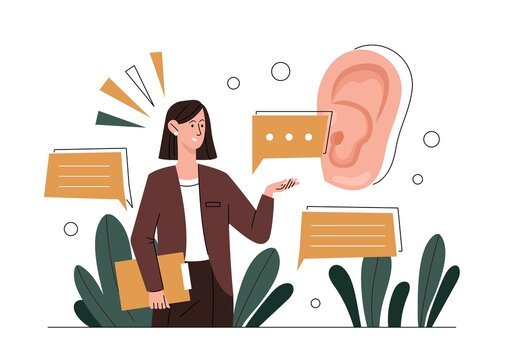Listening
Communicative English:-Listening Skills

Listening:
Definition of Listening
Listening is the active process of receiving, constructing meaning from, and responding to spoken or non-verbal messages. It involves not just hearing but understanding, interpreting, and evaluating the message.
Importance of Listening
- Improves understanding and knowledge.
- Builds better relationships.
- Helps in learning and retaining information.
- Essential for effective communication.
- Enhances problem-solving and decision-making abilities.
Types of Listening
Type Description
1. Active Listening :- Full attention to the speaker, understanding, responding, and remembering.
2. Passive Listening:- Hearing without full concentration or response.
3. Empathetic Listening :- Understanding the speaker’s feelings and emotions.
4. Critical Listening :- Analyzing and evaluating the message logically.
5. Selective Listening:- Listening only to parts of the message that interest you.
6. Appreciative Listening:- Listening for enjoyment (music, stories, speeches).
Process of Listening
1. Receiving: Hearing the message.
2. Understanding: Comprehending the meaning.
3. Evaluating: Judging the content.
4. Responding: Giving feedback.
5. Remembering: Retaining the information.
Barriers to Effective Listening
Physical :- Noise, poor hearing, technical problems.
Psychological :-Stress, emotions, prejudices.
Language:- Complex vocabulary, unfamiliar accents.
Cultural :- Differences in background, values, or traditions.
Personal :- Lack of interest, distractions, fatigue.
Qualities of a Good Listener
- Focused attention
- Patience
- Open-mindedness
- Non-judgmental attitude
- Ability to give appropriate feedback
- Avoiding interruptions
- Observing non-verbal cues
Tips to Improve Listening Skills
- Maintain eye contact.
- Avoid distractions.
- Take notes if necessary.
- Ask questions for clarification.
- Summarize key points mentally.
- Practice mindfulness.
- Develop empathy.
Difference Between Hearing and Listening
Hearing Listening
- Passive Active
- Accidental Intentional
- No understanding required Requires understanding
- Involuntary Voluntary
Listening in Different Contexts
- Academic Listening: Lectures, instructions, discussions.
- Professional Listening: Meetings, presentations, client interactions.
- Personal Listening: Conversations with friends, family.
- Media Listening: News, podcasts, entertainments
What's Your Reaction?

















